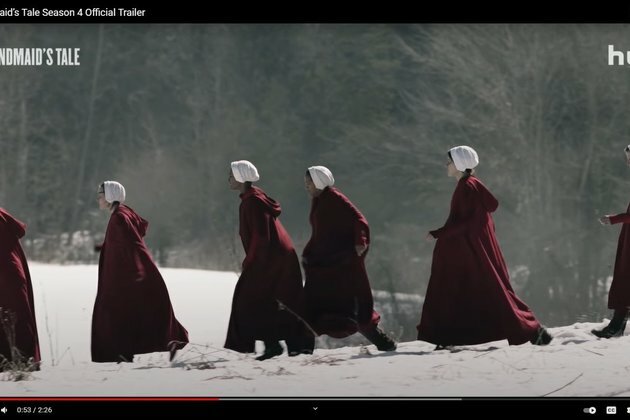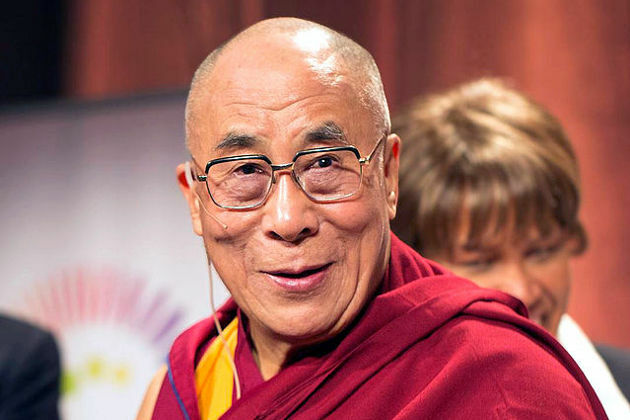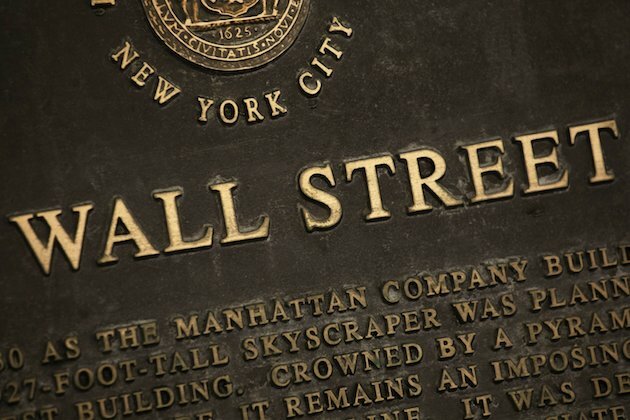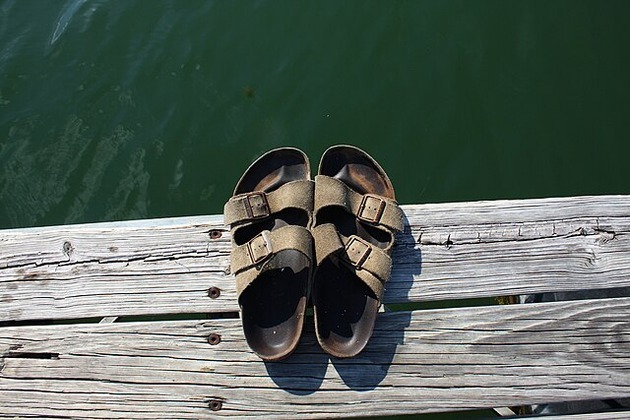Hulu's 'The Handmaid's Tale' casts Canada as a racial utopia
The Conversation
24 Nov 2021, 00:09 GMT+10

When Hulu's series The Handmaid's Tale premiered in 2017, reviewers noted its gripping drama and dystopian exploration of rape culture and misogyny at a time when both were hallmarks of Donald Trump's presidency.
The series is adapted from Canadian author Margaret Atwood's 1985 dystopian novel. It has won numerous awards and was recently renewed for a fifth season. But some commentators, including writer Ellen E. Jones, have criticized the series for its use of colour-blind casting that created inclusivity but otherwise ignored race in storylines. Others, including Noah Berlatsky, have analyzed how both the series and novel erase Black people's history.
Our research examines representations of race in speculative fiction and of Canada in U.S. literature, leading us to notice how Hulu's series represents race and national difference.
The show positions Canada as a morally superior nation that has rejected the dystopian society's repressive and exclusionist thinking. This is especially apparent in Season 4's focus on characters' escape to Canada, a theme that references older abolitionist narratives. In so doing, the show obscures Canada's history of slavery, colonialism and racism.
Atwood's dystopian world
Both the novel and show draw on U.S. history to imagine a dystopian world facing an unexplained fertility crisis. Gilead, a theocratic nation led by religious fundamentalists, has overthrown the U.S. government. Atwood's female narrator is an educated white woman forced to become a "handmaid." Each month, a commander rapes her in a religious fertility ceremony. Babies born to handmaids are raised by commanders and their wives. The sole purpose of the handmaids is to rebuild Gilead's population.
Writer Priya Nair explains that Atwood's novel draws on the historical oppression of Black enslaved women and applies it to fictional white women. For example, handmaids who are disobedient are beaten or hanged.
Despite clear parallels to slavery, Atwood only obliquely references slavery when the narrator explains that the "Children of Ham" have been relocated to the Dakotas. "Children of Ham" is a Biblical phrase that was used historically to justify enslaving Africans.
Nair also notes that the novel focuses on white women's oppression, while seemingly ignoring "the historical realities of an American dystopia founded on anti-Black violence."
While the novel relies on historical experiences of Black Americans, its characters are predominantly white, a feature of Gilead that Atwood maintains in the 2019 follow-up The Testaments. As reviewer Danielle Kurtzleben notes, in this second instalment: "Readers hoping to hear more about race in Gilead will be sorely disappointed."
Atwood intentionally framed Gilead as both misogynist and racist: the theocracy is interested only in reproducing white babies and, therefore, only enslaving white women.
Colour-blind casting in Hulu's adaptation
In adapting the novel, Hulu relied on a diverse cast of actors. White actor Elisabeth Moss plays June and Black British actor O-T Fagbenle portrays her husband Luke. Black actor Samira Wiley was cast as June's best friend Moira. Actors of colour portray characters of all class positions in Gilead's society.
Executive producer Bruce Miller acknowledges that he cast actors of colour in many roles to avoid creating an all-white world, which would result in a racist TV show. The show doesn't address race, he explained, because: "It just felt like in a world where birth rates have fallen so precipitously, fertility would trump everything."
The show then relies on colour-blind casting and colour-blind storytelling.
In Atwood's novel, Canada is the place to which handmaids escape, fleeing there on the Underground Femaleroad - a term that clearly invokes the Underground Railroad.
In Hulu's series, handmaids - including Moira - escape from Gilead to Canada where they find protection and safety, and are able to rebuild their lives. The series draws on older literary traditions that have been integral to maintaining the myth of Canada as free from racism.
Read more: I am not your nice 'Mammy': How racist stereotypes still impact women
Draws on abolitionist narratives
In the 1840s and 1850s, U.S. abolitionist authors intentionally represented Canada as a racial haven. By casting Canada as morally superior, abolitionists imagined what the U.S. might look like if slavery were abolished.
Abolitionist authors like Black songwriter and poet Joshua McCarter Simpson and white novelist Harriet Beecher Stowe celebrated Canada as a place that resisted racial violence and provided legal protection for Black refugees fleeing U.S. slavery.
Some abolitionists sought to capture the nuanced accounts of Black refugees in Canada. Abolitionist editor Benjamin Drew published oral testimonies of Black refugees, including their experiences of racism in Ontario.
Read more: Ancestry ad gets it wrong: Canada was never slave-free
Others, like Stowe, minimized the difficulties of the lived experiences of Black Canadians, focusing on stories of Black success in Canada. These celebratory narratives dominated representations of Canada in U.S. literature.
Canada as utopia?
Literary scholar Nancy Kang argues these abolitionist stories constructed an "allegory of Canadian freedom reigning triumphant over American bondage."
Hulu's The Handmaid's Tale escape-to-Canada stories draw on these historical narratives. The handmaid Emily, portrayed by white actor Alexis Bledel, escapes Gilead dramatically, entering Canada by wading across a rushing river, nearly losing June's daughter. Once across, she weeps over the baby, recreating an iconic scene from Stowe's Uncle Tom's Cabin, when the enslaved Eliza escapes slave-catchers by fleeing across a river with her child.
Read more: How 'Uncle Tom' still impacts racial politics
Later in the episode, an Asian Canadian doctor welcomes Emily to Canada, saying: "You're safe here."
On some level, Hulu's use of colour-blind casting, as Berlatsky notes, "addresses the narrative's debt to African-American history." But viewers are still watching an adaptation of a novel whose emotional horror is based on imagining violent, racist aspects of U.S. history as if the atrocities happened to white people.
Myths of Canada
The series avoids Canada's history of anti-Black racism, slavery and state violence against Black bodies, as detailed by gender studies and Black/African diaspora scholar Robyn Maynard in Policing Black Lives: State Violence in Canada from Slavery to the Present. It also overlooks Canada's colonial violence toward Indigenous peoples. These forms of violence are intertwined with seeking control over women's reproductive rights and sexual freedom.
The series also overlooks Canada's history of racist immigration and asylum policies.
Hulu's series does explore some of the consequences of patriarchal oppression. But the show's positioning of Canada as a racial haven obscures its history and the contemporary reality of racism experienced by BIPOC women and communities in Canada.
Authors: Miranda Green-Barteet - Associate Professor, Gender, Sexuality, and Women's Studies, Western University | Alyssa MacLean - Assistant Professor, Department of English and Writing Studies, Western University 
 Share
Share
 Tweet
Tweet
 Share
Share
 Flip
Flip
 Email
Email
Watch latest videos
Subscribe and Follow
Get a daily dose of Asia Bulletin news through our daily email, its complimentary and keeps you fully up to date with world and business news as well.
News RELEASES
Publish news of your business, community or sports group, personnel appointments, major event and more by submitting a news release to Asia Bulletin.
More InformationInternational
SectionPutin fires transport chief, later found dead in suspected suicide
MOSCOW, Russia: Just hours after his sudden dismissal by President Vladimir Putin, Russia's former transport minister, Roman Starovoit,...
Thousands gather in Himalayas as Dalai Lama celebrates 90th birthday
DHARAMSHALA, India: The Dalai Lama turned 90 on July 6, celebrated by thousands of followers in the Himalayan town of Dharamshala,...
Fans perform WWII-era Fascist salute at Marko Perković’s mega concert
ZAGREB, Croatia: A massive concert by popular Croatian singer Marko Perković, known by his stage name Thompson, has drawn widespread...
U.S. Treasury Secretary says Musk should steer clear of politics
WASHINGTON, D.C.: Elon Musk's entry into the political arena is drawing pushback from top U.S. officials and investors, as his decision...
TikTok building U.S.-only app amid pressure to finalise sale
CULVER CITY, California: TikTok is preparing to roll out a separate version of its app for U.S. users, as efforts to secure a sale...
Trump defends use of 'Shylock,' citing ignorance of slur
WASHINGTON, D.C.: President Donald Trump claimed he was unaware that the term shylock is regarded as antisemitic when he used it in...
Business
SectionBP appoints ex-Shell finance chief Simon Henry to board
LONDON, U.K.: This week, BP appointed Simon Henry, former Shell finance chief, to its board as a non-executive director effective September...
FedEx, UPS step up as Canada Post loses market share in strikes
OTTAWA, Canada: With Canada Post struggling to maintain operations amid labour unrest, rivals like FedEx and UPS are stepping in to...
U.S. stocks steady Tuesday despite tariffs turmoil
NEW YORK, New York - U.S. and global markets showed a mixed performance in Tuesday's trading session, with some indices edging higher...
Beijing blamed for covert disinformation on French fighter jet Rafale
PARIS, France: French military and intelligence officials have accused China of orchestrating a covert campaign to damage the reputation...
Birkenstock steps up legal battle over fakes in India
NEW DELHI, India: Birkenstock is stepping up its efforts to protect its iconic sandals in India, as local legal representatives conducted...
Beijing hits back at EU with medical device import curbs
HONG KONG: China has fired back at the European Union in an escalating trade dispute by imposing new restrictions on medical device...













